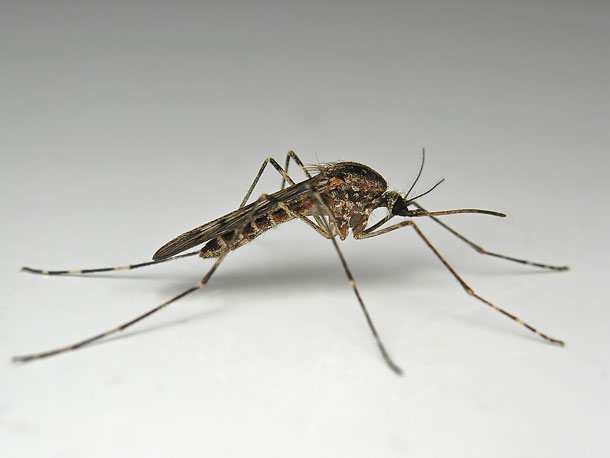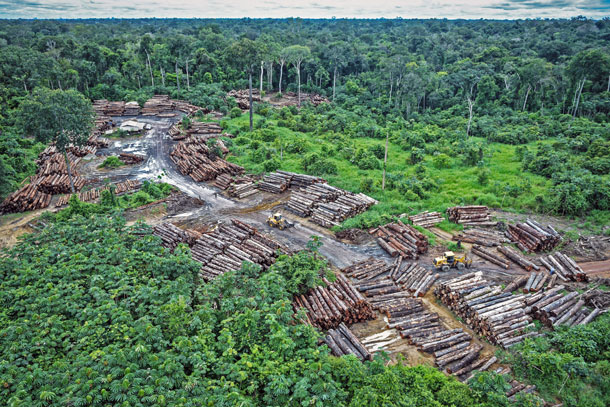Note on Emerging Science: Deforestation and Malaria
Air Date: Week of November 1, 2019

There are about 100 species of mosquito that can transmit human malaria. Mosquitos are responsible for more human deaths than any other animal on the planet. (Photo: Ryszard, Flickr, CC BY-NC 2.0)
Rainforests are a crucial ecosystem when it comes to fostering biodiversity, providing carbon sequestration, and even protecting human health. Researchers recently found that a 10% increase in deforestation in the world's rainforest is linked with a 3.3% increase in the number of malaria cases worldwide. Living on Earth's Don Lyman reports.
Transcript
BASCOMB: It’s Living on Earth I’m Bobby Bascomb.
CURWOOD: And I’m Steve Curwood.
Just ahead, a buyback of chainsaws to advance sustainable development in Borneo but first this note on emerging science from Don Lyman.
[SCIENCE NOTE THEME]
[MOSQUITO SOUND]
LYMAN: Mosquitoes have killed more people than any other animal in the world, mostly from malaria, and a new study finds rainforests that have been deforested have even higher rates of malaria than healthy forests.
Researchers from Stanford University analyzed 13 years of malaria occurrences from nearly 800 cities, towns and villages in the Brazilian Amazon. And they examined deforestation rates from the same time period.
The scientists found a 10 percent increase in deforestation led to an average 3.3 percent increase in malaria transmission. It may not sound like much but that means an additional 10,000 cases of malaria in some years.

Deforestation in the Amazon has been linked to higher rates of malaria. (Photo: Felipe Werneck, Flickr, CC BY 2.0)
Researchers say the increase in malaria was greater in the interior Amazon, where small scale clearing for new settlements created more forest edge habitat, ideal mosquito breeding grounds. And of course, more breeding mosquitoes in settlement areas mean more people will be bitten by the malaria transmitting mosquitoes.
To minimize malaria transmission the researchers conclude that rainforest conservation should focus on the large, intact areas of the interior of the Amazon. So, a healthy rainforest can lead to healthier people.
That's this week's note on emerging science. I'm Don Lyman.
Links
MongaBay | “Malaria Surges in Deforested Parts of the Amazon, Study Finds”
Living on Earth wants to hear from you!
Living on Earth
62 Calef Highway, Suite 212
Lee, NH 03861
Telephone: 617-287-4121
E-mail: comments@loe.org
Newsletter [Click here]
Donate to Living on Earth!
Living on Earth is an independent media program and relies entirely on contributions from listeners and institutions supporting public service. Please donate now to preserve an independent environmental voice.
NewsletterLiving on Earth offers a weekly delivery of the show's rundown to your mailbox. Sign up for our newsletter today!
 Sailors For The Sea: Be the change you want to sea.
Sailors For The Sea: Be the change you want to sea.
 The Grantham Foundation for the Protection of the Environment: Committed to protecting and improving the health of the global environment.
The Grantham Foundation for the Protection of the Environment: Committed to protecting and improving the health of the global environment.
 Contribute to Living on Earth and receive, as our gift to you, an archival print of one of Mark Seth Lender's extraordinary wildlife photographs. Follow the link to see Mark's current collection of photographs.
Contribute to Living on Earth and receive, as our gift to you, an archival print of one of Mark Seth Lender's extraordinary wildlife photographs. Follow the link to see Mark's current collection of photographs.
 Buy a signed copy of Mark Seth Lender's book Smeagull the Seagull & support Living on Earth
Buy a signed copy of Mark Seth Lender's book Smeagull the Seagull & support Living on Earth

